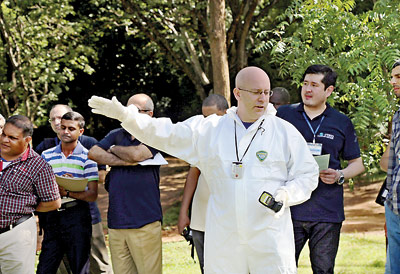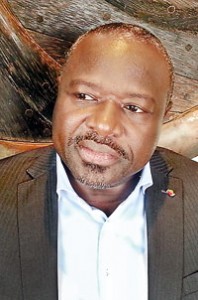News
Lanka could be nuke peace-maker in the region: CTBTO
Sri Lanka can play a leading role in bringing peace and stability to the South Asia region, Lassina Zerbo, Executive Secretary of the Comprehensive Test Ban Treaty Organisation (CTBTO) told President Maithripala Sirisena in Colombo yesterday.

The CTBTO held a workshop in Dambulla
South Asia is home to two nuclear powers—India and Pakistan—who have not signed the Comprehensive Nuclear Test Ban Treaty (CTBT).
They last conducted tit-for-tat missile tests in 1998. Since then, the rival nations are observing a voluntary moratorium on further testing.
The CTBT is a multilateral treaty under which countries agree to ban all nuclear explosions in all environments, for military and civilian purposes.
It was adopted by the UN General Assembly in 1996 but has not entered into force due to non-ratification by eight States.
Sri Lanka signed the Comprehensive Nuclear Test Ban Treaty in 1996 but has not ratified it. “If Sri Lanka ratifies the Treaty, it will send a strong signal to the neighbours that, despite everything, you believe that peace is far more important today than anything else,” Dr. Zerbo told the Sunday Times.
The Government maintains close cooperation with the CTBTO primarily through the Geological Survey and Mines Bureau. The GSMB operates the AS100-PALK seismic station in Pallekele, Kandy, set up with CTBTO assistance.
This week, 53 participants from 13 Asian countries gathered in Dambulla for an introductory course on onsite inspections, which are conducted to verify a country’s compliance with the CTBT. Dr Zerbo addressed the workshop on Saturday.
The event is part of CTBTO’s efforts to build a resource pool. “We want you in Sri Lanka to know what monitoring is about, what onsite inspections are about, what the technology used to monitor compliance with the Nuclear Test Ban Treaty is all about, what the 21st Century is bringing to us and what threats we have,” Dr. Zerbo said.
“By hosting this workshop, Sri Lanka is showing a commitment to the noble cause that we are defending—making sure that nuclear test explosions are banned, once and for all,” he averred. “We want countries like Sri Lanka to take leadership, especially in this region.”
“It is true Sri Lanka is neighbouring countries like India and Pakistan who, as you mentioned, are nuclear weapons countries,” he continued.
“But Sri Lanka could be that hub that brings peace and stability in terms of balancing the position of two countries that have been opposed in many aspects; but countries, as well, that are seeking peace and stability, not only in the region, but internationally.”
Inspectors of the GSMB have undergone many training programmes with CTBTO assistance. “They received instruction not only in onsite inspection but also in analyzing, processing and distributing data,” Dr. Zerbo said.

CTBTO Executive Secretary Lassina Zerbo
The Pallekele seismic station is part of the CTBTO’s international monitoring system. There are other stations around the world.
The international monitoring system is geared to detect anything that happens under water (hydro acoustic station), underground (seismic station) and in the air (infrasound station).
“If those stations fail to give the indication, with precision, that we are dealing with a nuclear test explosion, a decision cannot be made, like what happened in 2009,” Dr. Zerbo said.
“There was a nuclear test explosion by North Korea but we couldn’t detect any radionuclides.”“It’s important that your experts are trained to better understand how to deal with those issues, how to carry out an onsite inspection,” he emphasised.
“That’s why we are training inspectors and that’s why the entry into force of the Treaty is such an important issue. We cannot conduct an onsite inspection in a suspect country if the Treaty is not in force.
We can detect but we need entry into force to set up a mechanism under which the Executive Council of the CTBTO will vote for an onsite inspection.”
Dr. Zerbo said the threat of the use of nuclear weapons is real. “We see tension in the world today,” he pointed out. “We see terrorists who might get hold of nuclear weapons.
These have to be taken into account. This week, the whole world is in Paris, at COP 21, dealing with climate change. Climate change is a manmade threat. I think the use of nuclear weapons is another manmade threat the world needs to pay due attention to.”
“I think we should pay more attention,” he continued. “I think it’s about time that world leaders took the issue as seriously as they did climate change. The nuclear issue is a big manmade threat to humanity.”
No decent, democratic country has conducted a nuclear test explosion in the recent past. India and Pakistan last did so in 1998. “But it’s about time that we turn that voluntary moratorium into a legally binding framework that bans nuclear test explosions, once and for all,” Dr. Zerbo held.

